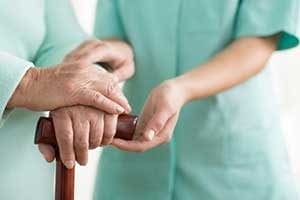Independent Home Care Provider Continuing Education
Watching your loved ones grow older can certainly be difficult, but in-home care can be a useful tool in allowing your elders to retain their quality of life and dignity as they age. However, if you are going to entrust the care and safety of your relatives to in-home care staff instead of a more traditional inpatient facility, you want reassurances that the care provided is going to be top tier. One way to do this is to ensure that the staff providing in-home care services are properly trained, and that their employer enforces a regular program of ongoing training and education for their team.
The Critical Nature of Continuing Education
 Nearly every professional working in health care is required to engage in regular continuing education. Doctors, psychologists, dentists, nurses and almost anyone else who works in these industries are required to complete a certain number of ongoing training and education hours each year. An excellent in-home care company should design continuing education guidelines specifically designed for in-home care workers. A provider of this service ensures that its team is ideally equipped to manage the wide range of health problems and injuries that they may encounter while working in your home, or the home of your loved ones.
Nearly every professional working in health care is required to engage in regular continuing education. Doctors, psychologists, dentists, nurses and almost anyone else who works in these industries are required to complete a certain number of ongoing training and education hours each year. An excellent in-home care company should design continuing education guidelines specifically designed for in-home care workers. A provider of this service ensures that its team is ideally equipped to manage the wide range of health problems and injuries that they may encounter while working in your home, or the home of your loved ones.
CPR in In-Home Care
There are some areas which are especially important when evaluating the ongoing training an in-home care team receives. Specifically, it is critical that these workers are receiving regular ongoing training in CPR. CPR is needs to be practiced and trained regularly in order for the person administering it to be effective. In addition, CPR protocols are often updated and adapted as research regarding its success or failure in various forms is accumulated. Regular training ensures that in the event of CPR needing to be administered, in-home care staff are ready to provide the most effective care possible.
The Needs of the Elderly
The daily care needs of the elderly differ greatly from those of the general population. First, people in the later years of their lives are much more susceptible to a variety of health conditions that require highly specialized care. For instance, alzheimer's and dementia are much more common beyond age 65. However, alzheimer's patients can sometimes benefit from in-home care, especially when the condition first appears or when it is only present in one member of a household.
Alzheimer's and dementia patients do require specialized care. Speaking to and working with someone suffering from alzheimer's or dementia is beyond the scope of the basic training received by some people providing in-home care. On the other hand, workers for the best agencies will receive ongoing training to help them work with clients living with these conditions. They learn how to speak and be patient when communicating with their clients. They are also trained on how to provide basic help with tasks like grooming and getting around the home which may be difficult for this group.
Social Interactions
 Loneliness can pose a very real health risk to elderly people. This is another area where ongoing training and education can help make in-home caregivers more effective at their jobs. One of the primary threats to the overall well being of the elderly living at home is social isolation. This occurs when health and mobility limit the social interaction options they have available to them.
Loneliness can pose a very real health risk to elderly people. This is another area where ongoing training and education can help make in-home caregivers more effective at their jobs. One of the primary threats to the overall well being of the elderly living at home is social isolation. This occurs when health and mobility limit the social interaction options they have available to them.
Specialized training can make in-home care workers better at providing social, mental and emotional stimulation for their clients during their visits. By workers providing more effective stimulation , it can make a huge difference in the quality of life the patient experiences in between visits. The right type of interaction keeps the mood of a client positive, alleviates symptoms of depression and lowers stress levels: all factors which have wide-reaching health implications.
Safety and Fall Prevention
The population of the United States is aging, with the average age of citizens on the rise. As a result, research into optimizing the lives and health of that population is expanding all the time. This means that new training opportunities are constantly being made available that can help in-home care workers learn new techniques to improve the health and safety of their clients in their homes.
Fall prevention is a perfect example of a new technique. Falls are a leading danger to health among the elderly population, but with proper training, a in-home care professional can provide valuable advice and help make changes in a home to prevent falls. Removing tripping hazards, making adjustments to optimize movement paths and installing mobility aids are just some of the ways that a well-trained worker can improve overall safety in the home.
The Best Care Possible
When you hire a health care professional to come into the home of your elderly parents or in-laws to provide them with care, it is vitally important that they have the absolute best tools at their disposal to protect the health and well being of your loved ones. Continuing education is an absolutely indispensable tool for a couple of reasons.
 In the first place, continual training sharpens existing skills and reminds people of things which may become automatic if they are not engaging in a training or educational process routinely. Mistakes happen in a wide range of professions when people start to engage in tasks without conscious care and attention to detail. In health care, the stakes associated with this type of mistake are far higher. Ongoing professional development and training is a very useful tool for ensuring this doesn't happen.
In the first place, continual training sharpens existing skills and reminds people of things which may become automatic if they are not engaging in a training or educational process routinely. Mistakes happen in a wide range of professions when people start to engage in tasks without conscious care and attention to detail. In health care, the stakes associated with this type of mistake are far higher. Ongoing professional development and training is a very useful tool for ensuring this doesn't happen.
Furthermore, the best providers of in-home care emphasize ongoing professional development, training and education in their workers because it allows them to stay on the cutting edge of senior care. There are too many cases of health care workers in disparate fields taking an action that leads to the harm of a patient, or which fails to help the patient, because the worker is unaware of new research or best practices in the field.
Home Evaluations
If you're interested in discussing the care of your loved ones with a company that knows the importance of ongoing training and education, including CPR training with our in-home caregivers, contact Comfort Home Care today. We provide free in-home care evaluations to help you understand how our services could help improve your loved ones safety, health, and quality of life.
Source: https://www.choosecomforthome.com/importance-training-home-health-care/